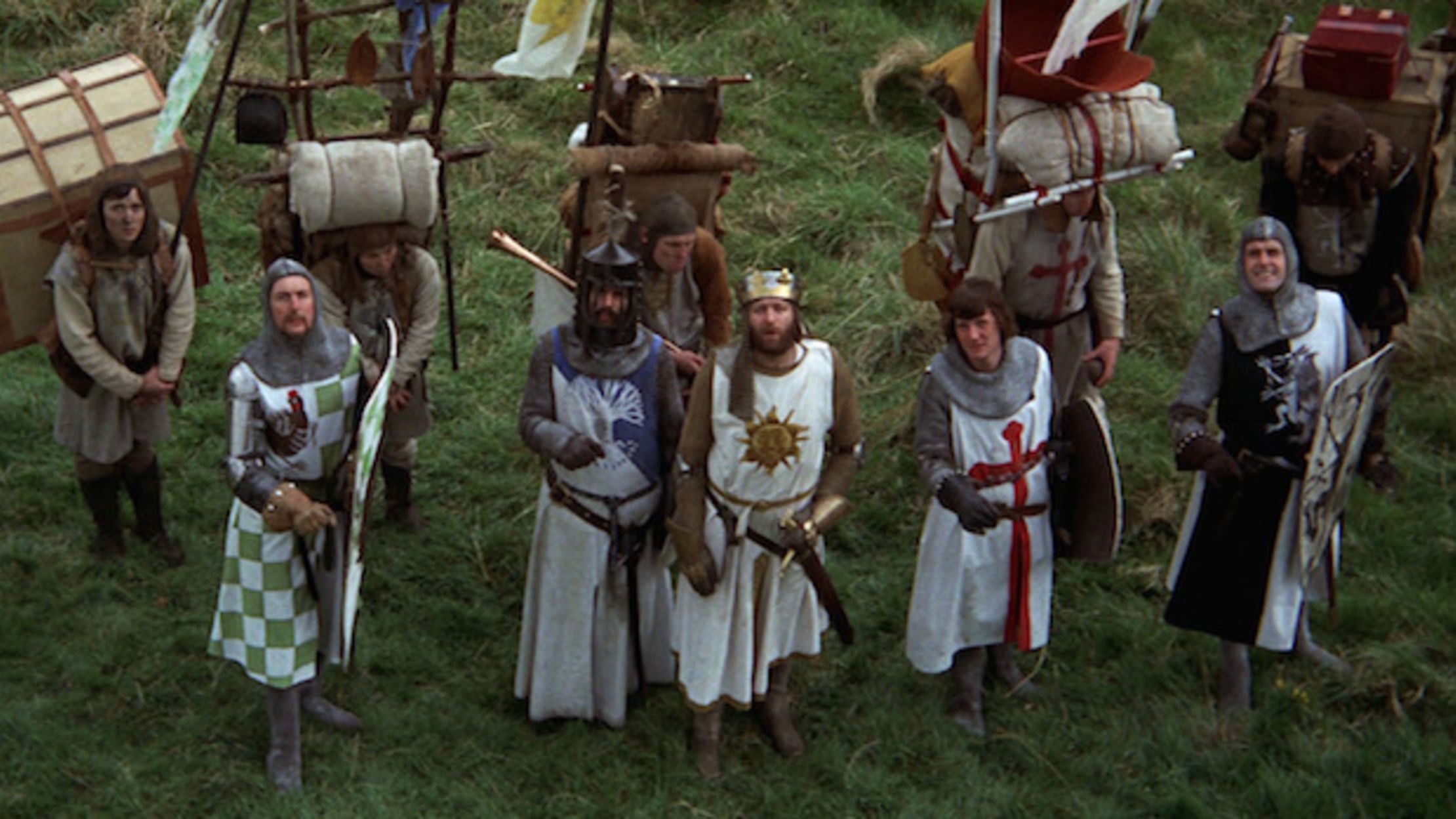Welcome to Rearview Mirror, a monthly movie column in which I re-view and then re-review a movie I have already seen under the new (and improved?) critical lens of 2020. I’m so happy you’re here.
Monty Python and the Holy Grail turns forty-five years old today, making it much older than the movies I usually cover for this column, and therefore, kind of a freebie. We’ve already evaluated and re-evaluated and re-re-evaluated this movie, and we like it! It’s a great comedy, one of the best, and I figured I could spend its ninety-minute runtime being delighted and distracted from What Is Happening Outside, and then just, like, quote it for a thousand words and be done.
And in addition to the fact that Holy Grail is a sterling, all-time fantastic film, most of the “dated” or problematic elements in the story were already addressed—brilliantly—in the stage adaptation of the movie, Spamalot. Spamalot nixed the castle full of horny teens and added a juicy female role—The Lady of the Lake—that won Sara Ramirez a Tony. Lancelot and the fey little prince stuck in the castle, both coded as gay in the movie, get a duet, a love story, and a happily-ever-after in the stage show. Holy Grail’s famous non-ending is replaced by a big, fun finale number after (spoiler!) the knights do find the cup they’ve been looking for.
So, freebie, right?
Not quite. After the absurd opening credits and the brilliant discussion of coconuts and swallows, King Arthur and his manservant encounter Dennis, a filthy peasant who articulates an economic argument that feels all too familiar. He challenges Arthur’s right to rule, saying he’s “exploiting the workers” and “hanging on to outdated imperialist dogma which perpetuates the economic and social differences in our society.” All of which was true in 932, when the movie is set, and in 1975, when the movie came out, and now, in 2020.
It’s both depressing to realize how long inequality has survived and bemusing to note that many of Twitter’s most self-righteous talking points aren’t exactly original. When Dennis says that “Strange women lying in ponds distributing swords is no basis for a system of government,” and “Supreme executive power derives from a mandate from the masses,” it’s hard not to think about the Electoral College and the bug-ridden caucus system being about as reliable as a woman in a pond.
Then they bring out the goddamn dead. There’s a plague in this movie, an actual plague, and people are dying in the streets and it’s…funny! It’s funny how casual everyone is about mass death, it’s funny how there’s a big pile of corpses being carted around town, it’s funny that this is normal to them. I’m laughing, crying, tearing my hair out, and, above all, washing my hands.
It’s not escapism—this isn’t Shirley Temple singing and dancing to lift our spirits from the Great Depression—it’s humor on a human scale.
As the movie goes on, thankfully, the parallels to The Things weaken. A mob of angry men dresses a woman as a witch and then uses how she’s dressed as proof that she is a witch, which is sort of relevant and sort of not. The Black Knight tries to gaslight his opponent and Robin fights a battle against toxic masculinity…but those are reaches, and I know it. Galahad storms the Castle Anthrax, where the Grail is not, but dozens of hot-and-ready teens are, but he fends off their advances before it gets creepy.
The quest and gags continue, and before you know it, one of the greatest movie comedies ever made is over. The humor holds up almost too well; if only a Lord class were a thing of the ancient past! And part of the reason it works, why it isn’t stale, is because the Pythons weren’t using the Olden Thymes to make some point about contemporary politics, which would put the film squarely in the seventies and not allow it the long shelf life it’s enjoyed since.
There’s an argument that we need comedy to make political arguments, that the jester is the only one who can tell the truth to the king without being put to death. There’s merit to that line of thinking. But it’s just as reasonable to use politics to make comedy, that is, to take the events of the day, or of the past, as fodder for comedy with the end goal being…laughter.
It’s not escapism—this isn’t Shirley Temple singing and dancing to lift our spirits from the Great Depression—it’s humor on a human scale. Yes, some chapters of history are perhaps too grim to serve as the backdrop for jokes (The Holocaust), and some are too recent, or as the saying goes, “too soon” (9/11). But Holy Grail proves that with the right touch, and hundreds of years intervening, even the Plague can be hilarious, and grim, and hilariously grim, and you can make a joke about mass death without it needing to be some call to action to stop mass death, as woke satire so often is today. Put another way: Yes, I saw a lot of parallels to today re-watching Holy Grail. But thank the lord in heaven above, the movie wasn’t trying to fucking teach me anything, hallelujah and amen.
Look, I certainly don’t want to be the one to make the “Ha ha, wasn’t COVID-19 a hilarious clusterfuck” comedy, but if in a thousand years someone else wants to, heck, OK. Go for it. And don’t make it a depressing and nihilistic movie, either. Make it funny and nihilistic. As another Python number put it, look at the many bad things in life…from the bright side. FL









